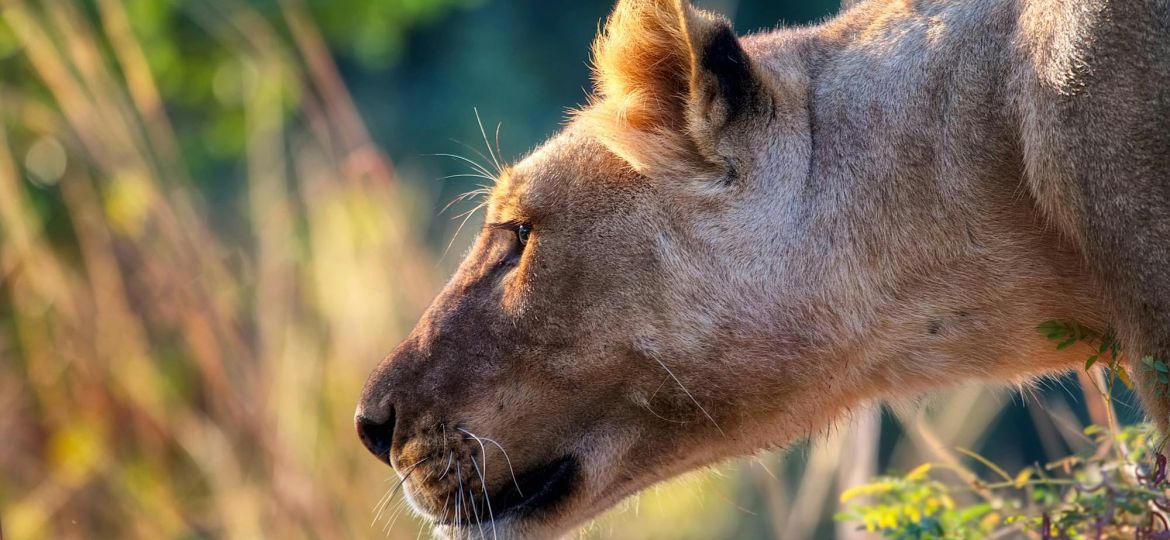
How a Zimbabwean farm girl who grew up with a pet lioness named Carmel became the unlikely disruptor of Africa’s male-dominated safari industry
When Deborah Calmeyer was twelve, her father came home with a lioness. Not a cub, exactly – Carmel was already sizeable enough to terrify the neighbours – but young enough to think she was the family’s third Labrador. The lioness would wait at the school gates, ride shotgun in the family car, and sleep at the foot of her father’s bed. “One swipe and our other dogs would go flying!” Calmeyer told Elite Traveler, recalling her extraordinary childhood on a Zimbabwean dairy farm.
This was 1985, just after the Liberation War ended. Her zoologist father had, in Calmeyer’s words, “traded all the security and alarms and fences for a rescued lioness.” It’s the kind of detail that makes you wonder about the Calmeyer family’s particular brand of logic – or perhaps their understanding that in Africa, the wild and the domestic have always been more fluid categories than outsiders imagine.
Today, at fifty-one, Calmeyer runs ROAR AFRICA from bases in Cape Town, New York, and Miami, orchestrating over 300 safaris annually for clients including Robert Redford and Leonardo DiCaprio. Her “Greatest Safari on Earth” costs $150,000 per person for twelve days. Yet this empire began with $2,000, a hastily built website, and sixty people crammed into her New York apartment for a South African wine tasting.
War and Water Skiing
Born in 1973 in what was then Rhodesia, Calmeyer’s childhood reads like magical realism. The Liberation War provided the soundtrack – she was five when it began – while daily life continued with a surreal normality. She water-skied on Lake Kariba, indifferent to the crocodiles. She swam while elephants drank from their pool. She competed in show jumping. Once, she found herself trapped between a pack of wild dogs and their prey, an experience she mentions almost casually in interviews.
The Calmeyers weren’t recent arrivals playing at being African. The family’s roots stretched back over 300 years – her great-great-grandfather started a Cape Town auctioneering business that still operates. They farmed land once owned by diamond magnate Harry Oppenheimer. They were, in short, embedded in the continent’s complicated history of privilege and belonging.
At fifteen, with Mugabe’s regime tightening its grip, the family fled to South Africa. But Deborah had already set her sights on Manhattan.
The Accidental Safari Queen
Calmeyer started working in New York (a place she frequently refers to as a concrete jungle) at twenty-four. She had a technology sales job, little money, and a very limited circle of friends. No surprise then that she had pangs of homesickness for the country and continent she’d grown up in.
What saved her, oddly enough, were the dinner parties. Every time someone heard her accent, they’d launch into their safari dreams, pulling out itineraries that made no geographical sense. She’d find herself sketching better routes on napkins, suggesting lodges, explaining why you can’t really “do” the Okavango Delta and the Serengeti in the same weekend.
After six years of this – six years of working days in tech sales and nights as an unpaid travel consultant – her father found himself forcibly retired at sixty-five. Practical as ever, Calmeyer saw an opportunity: get him a guiding licence, send him a few families a year. “Just a bit of a side hustle in his retirement.”
The business model was brilliantly simple. She spent her entire savings on a website, threw a wine-tasting party, and announced her new venture. One friend’s parents booked. Then their in-laws. Four trips that first year. Not exactly an empire, but a start.
The Wall Street of the Bush
“It’s like working in the Wall Street of the bush,” Calmeyer told Elite Traveler about breaking into the safari industry. “Run by men who are a real pain in the arse with confident, demanding women like me.”
For six years, she maintained both careers – days selling technology, nights and weekends building ROAR AFRICA. Maps spread across her apartment floor. Phone calls at midnight to confirm lodge availability. Learning the hard way that in the safari world, being female meant constantly proving yourself.
The turning point came when Robert Redford called. He wanted to return to Africa for the first time since filming Out of Africa in 1985. The trip had to be perfect – emotionally resonant, logistically flawless. When it was over, Redford told her she had a gift.
“That was my Oscar,” Calmeyer later wrote on LinkedIn, reflecting on “the alchemy of travel and the incredible friendships that come from it.” When Assouline published their first-ever safari book featuring her “Greatest Safari on Earth,” Redford contributed a testimonial.
Revolution in the Savanna
What Calmeyer built wasn’t just another luxury safari company. ROAR AFRICA employs forty full-time staff, 85% of them women. Her philosophy – “If African women rise, wildlife will thrive” – isn’t corporate speak. It’s policy.
The Women’s Empowerment Retreats, launched in 2019, exemplify this philosophy in action. Every role – from the pilots flying the planes to the guides leading game drives to the chefs preparing meals – is filled by women. The impact was immediate: after one retreat, two women from the waiting staff pulled Calmeyer aside. “We didn’t know women could become guides,” they said. “How do we sign up?”
The impact ripples outward. The most recent retreat generated half a million dollars for five Kenyan documentaries. Participants fund scholarships at the Girls’ College of Tourism. They support Dr Lucy King’s research using beehives to deter elephants from crops.
“Americans by nature are extremely philanthropic,” Calmeyer observes. “The kind of traveller we attract cares deeply about understanding not just where they are going but how they can make a difference.”
The Power of Ultra Luxe
ROAR AFRICA trades in serious luxury. The “Greatest Safari on Earth” ferries just ten guests annually via Emirates private jet (with individual cabins) to Victoria Falls, the Okavango Delta, Kenya’s Great Migration, and Rwanda’s mountain gorillas. Helicopter transfers. Champagne in the bush. Lodges so exclusive they don’t appear in guidebooks.
Calmeyer has another revolutionary idea to build room. She believes most safari-goers miss the point by focusing solely on animals. Because of this, she introduces clients to what she calls Africa’s “other Big 5” – art, culture, fashion, design, and food. A ROAR safari might include helicopter visits to Kenya’s last pastoral tribes or private exhibitions with contemporary Zimbabwean artists.
When Assouline – publisher of $500 coffee table books for people who collect $500 coffee table books – decided to create their first safari title, they chose Calmeyer’s vision. The resulting tome features 350 illustrations mixing wildlife photography with profiles of African artists and conservationists.
Is it excessive? Absolutely. Calmeyer doesn’t pretend otherwise. When Elite Traveler asked about the carbon footprint of private jets to pristine wilderness, she didn’t dodge the question: “If someone says to me, ‘Do you want to go on a private jet or fly commercial?’ – I’m going on that private flight! Because commercial is hell.”
She purchases carbon credits at 1.5 times emissions. She ensures money flows to local communities. But her honesty doesn’t allow her to underplay the contradictions.
The Medicine of the Wild
Recently, Calmeyer has been exploring what she sees as safari’s deeper purpose. She’s partnered with philosopher-zoologist David Whyte to create retreats that blend wildlife viewing with reflection on humanity’s disconnection from nature. In her view, modern life has created a kind of nature deficit disorder, and the African wilderness offers something essential – a chance to remember who we are when stripped of urban armour.
It’s an evolution from luxury travel towards something more primal. She speaks of missing not just Africa when she’s away, but missing the person she becomes there. Her latest venture explores South Africa’s Cape Floral Kingdom, home to more plant species per square kilometre than anywhere on Earth. The Big Five remain a draw, but Calmeyer is increasingly interested in the small wonders, the overlooked miracles that make Africa extraordinary beyond the perpetual focus on animals.
The Price of Paradise
Calmeyer has built something remarkable: a female-led company in an industry that didn’t want her, offering experiences that remain fantasies for all but the ultra-wealthy while generating real benefits for African women and wildlife. She is, undeniably, a pioneer – proof that glass ceilings can be shattered even in the most unlikely places.
Yet the contradictions remain sharp. These transformative experiences she sells are available only to those who least need transformation. The communities that benefit still depend on foreign wealth. The wild places survive because rich people will pay fortunes to visit them.
When asked about this, Calmeyer doesn’t philosophise. Her approach is pragmatic: this is the world as it exists. Within its constraints, she’s carved out space for women to lead, for communities to benefit, for her beloved Africa to be shared on her terms.
For the 2025 Women’s Empowerment Retreat in Botswana (8–12 April) or The Greatest Safari on Earth, contact [email protected].

